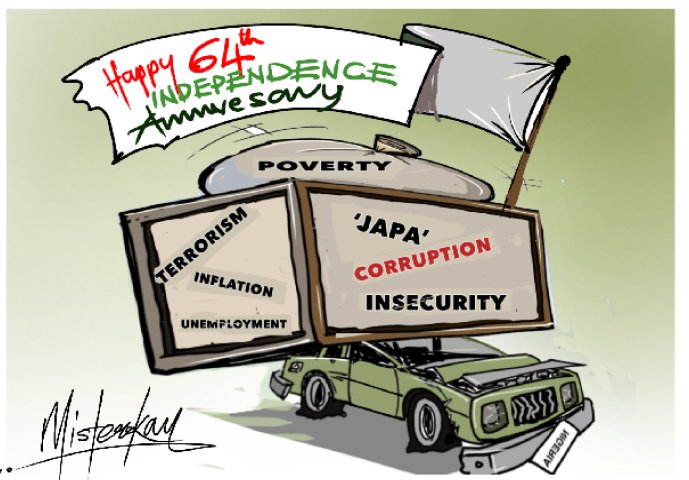Last year, as Nigeria celebrated 63 years of independence, this column published articles that painted a bleak picture of the nation. Tuesday was another anniversary, but nothing changed. To commemorate this year’s Independence Day, we have reproduced our 63rd Anniversary message below. To my fellow countrymen, especially those who find it extremely difficult to meet their basic needs due to harsh economic policies, I say: Congratulations on your independence in the era of “Reborn Shege”!
Perhaps because we have stopped teaching history in schools and about 70 percent of the country’s population is under the age of 30, we need a reminder that Nigeria gained independence from British colonialism on October 1, 1960. It is thought that there is.
Three days from today, we will be celebrating another Freedom Day, but the current situation in the country raises questions about the appropriateness of celebrating this milestone.
In a commendable move, the federal government chose to celebrate the 63rd anniversary of independence in a low-key manner. This decision is in line with prevailing sentiments among many Nigerians. Why celebrate when the vast majority of our people are struggling to survive due to devastating economic challenges exacerbated by incompetent leadership across successive administrations and made even worse by the current administration? Is it?
A seemingly intractable problem
More than 60 years after gaining independence, Nigeria is still grappling with the same fundamental problems that its early post-independence leaders were grappling with before the military intervened. Ironically, even during the military regime, the situation was not as dire as it is today. Corruption, unemployment, poverty and soaring prices for essential goods are making us wonder if we are moving backwards rather than progressing. In fact, most Nigerians believe that the country is in reverse gear, and they may be right.
Consider the depreciation of our currency, the Naira, against the US dollar compared to the 1980s. Alarming inequality and the fact that we rely heavily on income in dollar-controlled markets speak volumes about today’s economic challenges.
Nigeria is an oil-rich country with no functioning refineries and exports crude oil while importing refined products, further weakening the naira. Despite having abundant arable land, the country is heavily dependent on food imports and struggles to feed its people.
Alarmingly, Nigeria spent a staggering N1.9 trillion on food imports in 2022 alone, an increase of 5% from the previous year. Over six years, the country has racked up food import bills of over seven trillion naira. This has exposed serious doubts about the country’s ability to achieve sustainable food security and eradicate hunger, a fundamental goal of the 2030 Sustainable Development Goals (SDGs).
Food crises are intertwined with rising unemployment and poverty, contributing significantly to worsening security insecurity. According to the National Bureau of Statistics, more than 130 million people
Nigerians live in multidimensional poverty, with 63 percent of the population living in extreme poverty, mainly in rural areas. According to the World Food Program, more than 20 million of these people face severe hunger.
It certainly defies logic that a resource-rich country with arable land suitable for growing a variety of food and cash crops should face an existential threat posed by famine. But that is the story of Nigeria, where, 63 years after independence, long-term terrorist activities and persistent farmer-herder conflicts have seriously affected food production.
Unfortunately, there is nothing to suggest that we are any closer to finding solutions to our country’s myriad challenges.
there’s nothing to celebrate
Sixty-three years later, how can we talk about Independence Day celebrations when there are an unbearably large number of school-age children outside the four walls of the classroom? At the latest count, there are over 15 million such children, with a regional/geopolitical breakdown as follows: North West (8.33 million people). Northeast (3.72 million people). North Central (1.81 million people). South-South (700,000); Southeast (390,000) and Southwest (1.19 million).
Leaders have made the lives of young people unduly harsh, japa (immigration) has become the norm, and rising unemployment and poverty have caused young people to leave the country in droves, making it impossible for them to realize this. country. There is no need to celebrate independence when you can reach your full potential.
You can’t celebrate Independence Day in a big way when your government fails abjectly, or better yet, blatantly refuses to fight terrorism. Terrorists kill, attack, and displace communities, rape and kidnap residents, and demand ransom payments with such audacity that you wonder if this is a banana republic. As I write this, some students from the Federal University of Gusau in Zamfara, one of the states bearing the worst brunt of the insecurity, are being held by these terrorist elements.
The challenges are multifaceted and are not limited to the alarming rise in education systems, health care, infrastructure and security. This country is grappling with terrorism, oil theft, and economic sabotage in the face of massive corruption at the top, all of which continue to undermine our economy.
Existential threat?
Times like these remind our people of the existential threat that looms and test our faith, no matter how optimistic we may try to be.
Only time will tell whether the current government will bring the new hope that the people so desperately need. But that’s questionable, to say the least.
Even in the face of these daunting challenges, celebrating independence is not justified when millions of school-age children remain outside the classroom, terrorism ravages communities, and corruption continues unabated. It’s difficult to do.

